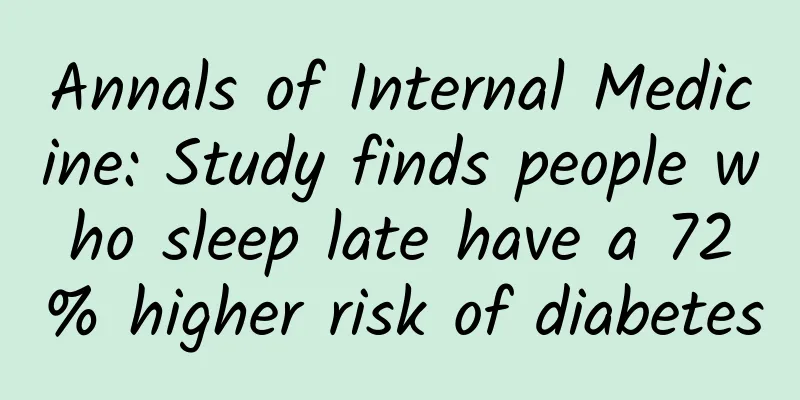Annals of Internal Medicine: Study finds people who sleep late have a 72% higher risk of diabetes

|
A large study of middle-aged nurses found that those with an evening chronotype were more likely to adopt an overall unhealthy lifestyle, especially smoking, insufficient sleep and lack of exercise, and had a 72% higher risk of diabetes. A recent study involving more than 60,000 middle-aged nurses found that people with "evening chronotypes" who feel more energetic later in the day are at a higher risk of diabetes. In addition, these people tended to exhibit unhealthy lifestyle habits, such as smoking, insufficient sleep and lack of exercise. This was compared with morning people. However, the authors noted that factors such as the participants' occupation, education level and socioeconomic status may have influenced these results. The findings were published September 12 in the Annals of Internal Medicine. Understanding circadian rhythm Circadian typology, also known as "circadian preference," is a partially genetically determined construct that refers to a person's tendency toward earlier or later sleep times. Approximately 8% of the population has an evening sleep chronotype. Notably, this is associated with poor metabolic regulation, impaired blood sugar control, metabolic disorders, and a higher incidence and prevalence of type 2 diabetes. However, the exact cause of the link between "evening typology" and increased diabetes risk remains elusive. Detailed research results Scientists from Brigham and Women's Hospital and Harvard Medical School conducted a prospective cohort study of 63,676 nurses aged 45 to 62 years with no history of cancer, cardiovascular disease, or diabetes between 2009 and 2017. The researchers found that participants with a "clearly late" chronotype were 54% more likely to have an unhealthy lifestyle compared to those with a "clearly early" chronotype. Those with a "clearly late" chronotype also had a 72% higher risk of developing diabetes during the follow-up period. According to the authors, this association was attenuated but remained even after adjusting for all measured lifestyle and sociodemographic factors. They emphasize that these results are limited to people who have not worked night shifts recently. Future investigations in other populations using genetically determined chronotypes are needed to determine whether their findings apply to men, non-white racial or ethnic groups, or other socioeconomic classes. In addition, generational differences in diet, exercise, and weight may limit the applicability of their findings to younger or older generations or to the present day. Editorial Views In an accompanying editorial, the authors from the Harvard T.H. Chan School of Public Health and Harvard Medical School emphasize that several factors, including psychological factors, type of work, and possible lifelong changes in chronotype, could confound the study's findings. They add that the findings suggest that circadian misalignment may be the underlying mechanism for these results, due to a mismatch between chronotype and work schedule, rather than chronotype. The editorial authors suggest that this study adds to a growing body of evidence that moving evening chronotype workers to the night shift may improve sleep and metabolic health in shift workers. Finally, they note that these results suggest that there may be benefits to developing standardized tools to periodically assess chronotype throughout a person's life. |
<<: New iPhone disassembly: 6 Plus battery life is about twice that of 5s
Recommend
SMMT: UK commercial vehicle production to grow 16% in first half of 2023
According to the latest figures released by the S...
Practical course on sharing good things on Douyin, no need to shoot, simple editing, short videos can quickly increase followers (125 video courses)
Douyin good things sharing practical course, no n...
Beijing is under blue warning for heavy rain! Please be careful when staying at home or traveling →
Monday morning rush hour Beijing, Tianjin, Hebei ...
Zhu Kezhen: The weather is always changing, but your heart remains unchanged
Liu Qian and Zhang Yingxian Editor's Note Rec...
I heard that eating watermelon for dinner can help you lose weight? Are you a qualified watermelon eater?
Many people saw "eat half a watermelon at ni...
Why does my conjunctivitis recur when winter comes?
Winter is here, the air becomes cold and dry, and...
Chuzhou SEO training: How do small and medium-sized enterprises do Internet marketing? What are the differences between different methods?
Small and medium-sized enterprises are often limi...
96% of mobile malware targets Android: More than 5 billion apps can be attacked
The report said that 96% of mobile malware target...
Wang Xuehong is obsessed with VR: HTC CEO may fall into industry misunderstanding
At the recently concluded MWC2016, VR once again ...
Is freshly slaughtered meat the freshest? The key to choosing a good piece of pork is to look at these 6 points →
Rumor: "Meat that has just been slaughtered ...
Xi'an high-end T-stage selection of boutique recommendations 24 hours a day online appointment arrangement
Xi'an high-end T-stage selection of exquisite...
Major adjustments! The ninth version of the COVID-19 prevention and control plan has been released, with these changes →
(Photo source: Xinhua News Agency) In order to fu...
Apple closes iOS 8.1.2 verification to block jailbreakers
Apple officially closed the iOS 8.1.2 verificatio...
This year, these world records were set by China!
Recently, the world's largest container ship ...
Popular Science in Central Plains丨@Grandpa and Grandma, all the questions you care about about the new coronavirus vaccination are here!
Dahe.com (Reporter Shen Hua) At present, the COVI...









